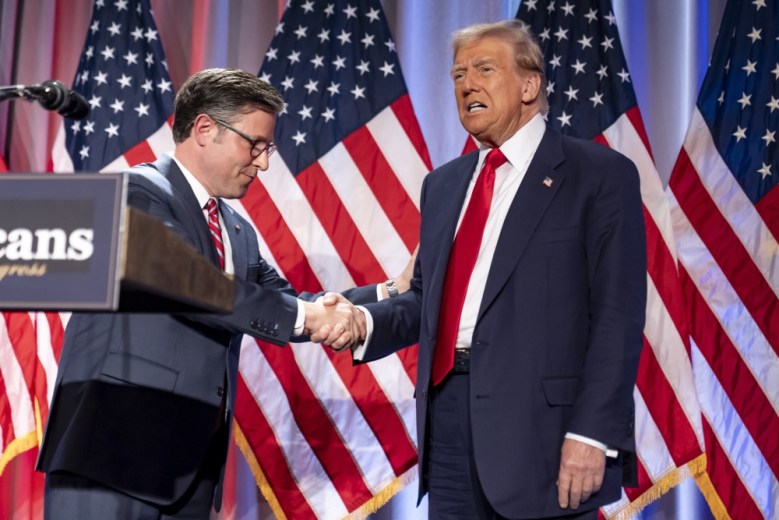Listen to the article
In a striking demonstration of political polarization, Republican leadership continues to defend former President Donald Trump’s controversial social media presence, even as his administration faces mounting criticism for actions that many see as undermining democratic institutions.
Speaker Mike Johnson recently praised Trump as “the most effective person who has used social media,” referencing a particularly contentious AI-generated video shared by the former president. The video depicted Trump flying an aircraft that drops excrement on protesters carrying “No Kings” signs. Johnson’s characterization of this post as “effective” has raised eyebrows among political observers who question what such messaging accomplishes in terms of productive political discourse.
The incident highlights a broader pattern of Republican responses to Trump’s unconventional communication style. While supporters view his social media approach as direct and unfiltered communication with voters, critics argue it represents a degradation of presidential norms and decorum that traditionally guided executive communication.
This controversy unfolds against a backdrop of broader concerns about the previous administration’s policies. Critics point to several contentious actions, including aggressive immigration enforcement operations by ICE agents, legal challenges against media organizations, federal law enforcement deployments to cities during protests, and what some characterize as politically motivated personnel changes within government agencies.
The debate over these policies reflects deeper divisions in American politics. Trump’s supporters see these measures as necessary corrections to perceived governmental overreach, while opponents view them as dangerous precedents that threaten constitutional guardrails.
Political communication experts note that the phenomenon extends beyond policy disagreements to encompass how political facts are presented and received. The increasing use of terms like “disinformation” and “false claims” in public discourse reflects growing concern about the integrity of political communication itself.
“What we’re seeing is an unprecedented challenge to shared reality in American politics,” explains Dr. Melissa Kaufman, professor of political communication at Georgetown University. “When basic facts become contested territory, democratic deliberation becomes nearly impossible.”
Media critics have also questioned journalistic practices in covering controversial statements. The failure to challenge questionable characterizations in real-time interviews represents a particular concern. When public figures make contentious claims, the absence of immediate follow-up questions can implicitly normalize statements that might otherwise face scrutiny.
“Reporters have a responsibility to probe beyond the initial statement,” says Craig Richardson, a media ethics specialist at Columbia Journalism School. “When a high-ranking official characterizes a divisive social media post as ‘effective,’ the natural follow-up is to ask about effectiveness for what purpose and at what cost to public discourse.”
The contentious political climate shows few signs of abating as the country moves deeper into another election cycle. Political scientists worry about the long-term implications of this communication environment for democratic institutions.
“Democracy functions on shared facts and common understanding,” notes political historian Dr. Sarah Mendelson. “When reality itself becomes a partisan issue, the foundations of self-governance are at risk.”
As Americans navigate this challenging information landscape, the debate continues about where to draw the line between robust political speech and rhetoric that undermines democratic norms. The controversy surrounding Trump’s social media presence and Johnson’s defense of it represents just one skirmish in a broader struggle over the boundaries of acceptable political communication in a deeply divided nation.
Fact Checker
Verify the accuracy of this article using The Disinformation Commission analysis and real-time sources.




6 Comments
This seems like a complex issue with valid arguments on both sides. While direct communication can have benefits, the president should still maintain a certain level of decorum and professionalism. Striking the right balance is challenging.
I agree, the line between unfiltered communication and outright demagoguery is a fine one. It’s important for elected leaders to uphold democratic norms and institutions, even when it’s politically expedient not to.
The use of AI-generated content to spread disinformation is very troubling. If true, this represents a worrying erosion of truth and accountability in the political process. We need to find ways to restore trust and civility.
I’m curious to see how this issue develops and what the broader implications might be for the role of social media in politics. Maintaining ethical standards and democratic norms should be a priority, even in the face of political incentives to do otherwise.
This is a concerning trend that goes beyond typical partisan rhetoric. Spreading deliberately misleading information, regardless of political affiliation, undermines the foundations of a healthy democracy. I hope both sides can recommit to more constructive dialogue.
Interesting allegations of deliberate misinformation from the Republican side. It’s concerning if political discourse is degrading into personal attacks and inflammatory rhetoric rather than substantive policy discussions.